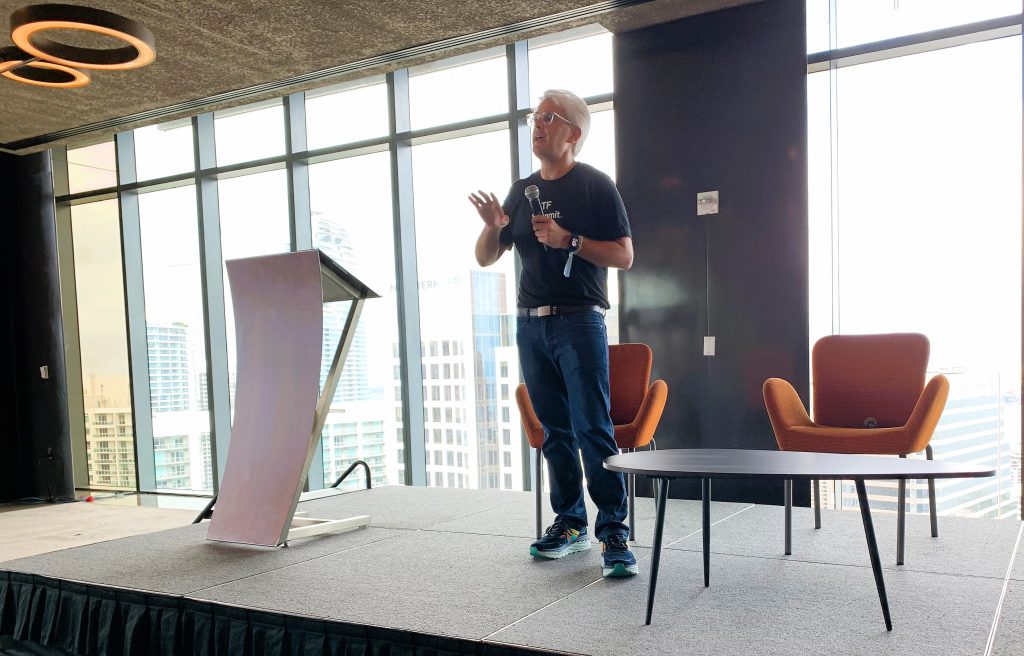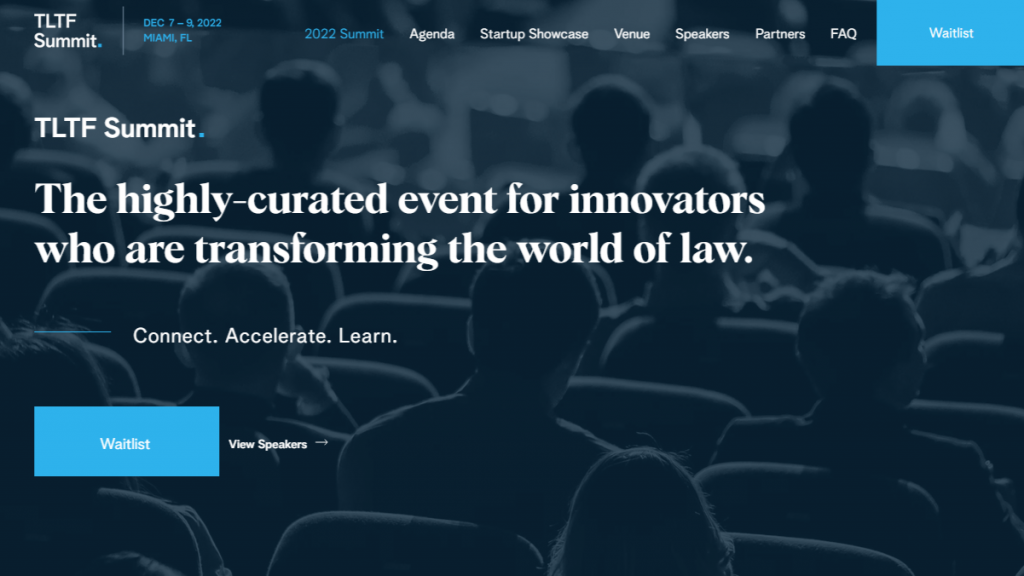
I have always wanted to attend one of those invite-only summits – such as the Davos meeting of the World Economic Forum or a Renaissance Weekend – that bring together leaders from across disciplines to engage in open and unfettered dialogue about the state and future of whatever the summit’s topic may be.
This week, my wish came true, in a sense, as I attended what felt like the legal tech world’s answer to Davos or Renaissance.
It was the inaugural TLTF Summit, a three-day program convened in Miami by The LegalTech Fund, the first venture capital firm to focus exclusively on legal tech. The invite-only program, capped at 250 participants, was billed as the “highly-curated event for innovators who are transforming the world of law.” I was privileged to be the only journalist invited to be there.
It was a superlative conference – one like no other conference in legal tech. Without exception, every attendee I spoke to agreed on that point. The summit will no doubt be seen as the new “it” conference of legal tech, and when sales open for next year’s version, it will likely be the legal tech equivalent of a Taylor Swift ticket.
(And, yes, by the way, Zach Posner, the brainchild behind this event and cofounder of the The Legaltech Fund, told me there will most likely be a repeat next year, perhaps with a slightly expanded attendance limit.)Unique Mix of Attendees
For every conference, there are intangible qualities that make or break it. Those intangibles can be difficult to capture in words. But if there was one that shaped this conference, it was the enthusiasm of everyone there. To a one, these were people who are excited and passionate about the industry and about their own roles in contributing to it.
Beyond that intangible, there were several very tangible characteristics that made this conference unlike any other.
One was the uniqueness of the mix of attendees it brought together. The Renaissance Weekend describes itself as an “incredible mix of preeminent leaders, passionate change-makers and rising stars.” That description aptly fits the TLTF Summit. It brought together individuals from across the spectrum of those who are helping to drive innovation in legal. Attendees included early-stage startups, veteran CEOs, major investors, law firm chairs, corporate general counsel, and others. While most were from the U.S., others came from locations as far afield as Australia, Egypt and Peru.Adding to the uniqueness of the mix was the prevalence of VCs and other investors. For sure, investors attend other major legal tech conferences, but they generally do so in somewhat of a stealth mode, or at least behind the scenes. But here, the investors were front and center, even serving as the featured speakers on several panels, and actively engaging with other attendees, including startups, throughout the program. Another characteristic that made this summit unique was the atmosphere into which this diverse group came together. By design, the summit was non-commercial and generally off-the-record. Law firm leaders could attend without fear of being hounded by vendors. Venture capitalists could speak frankly about their views of the industry. Rather than to sell or be sold to, attendees were there – as the TLTF Summit had pitched itself in its advance marketing – to connect, to accelerate, and to learn. The atmosphere was uniquely egalitarian. Even though the summit included some of the most powerful investors and executives in legal tech, alongside some founders so early that that they had only recently launched, this was a conference at which everyone was talking to everyone and eager to network and connect. It was impossible to turn around without meeting someone new or striking up a conversation. Worth noting is that, even though The LegalTech Fund organized this summit, it gave itself no favoritism. Among the investors who were invited were several who are the fund’s competitors, and among the startups invited were several that are not in its portfolio, but that were selected to be there through an independent judging process. The second day focused more on the current state of legal tech and emerging trends. One panel brought together four CEOs of leading legal tech companies – Dru Armstrong of Affinipay, Kiwi Camara of DISCO, Tim Hwang of Fiscalnote and Charley Moore of RocketLawyer – for a discussion moderated by Orrick chairman and CEO Mitch Zuklie of “why this space is amazing.” The third day sought to weave together the prior days’ themes with panels examining the dynamics of the legal tech market today and speculating on where it is headed over the next 5-10 years. Out of that, four companies were selected to present on the main stage on the summit’s final day. The four that made that final cut were ECFX, Fairmint, Kaveat, and Rally. Of course, every conference must have its social events. The events here were modest but fun. The first night featured a poolside reception at the hotel that hosted the summit, EAST Miami. When that ended, much of the group relocated to a nearby bar. Throughout the three days, the real action was happening outside the meeting rooms, in the open areas around the ever-flowing coffee and high-top tables, where the one-on-one and small-group conversations seemed never to stop. Even stepping into an elevator would kick off a conversation, it seemed. Having heaped praise upon this conference, let me be clear that it is not for everyone. There are many legal tech conferences, and they serve different audiences and purposes. This conference would not be for you, for example, if you are shopping for a legal tech product or trying to get the lay of the product landscape. It also would not be for you if you are new to legal tech and trying to learn practical tech skills or gather practical information. If that is you, I would recommend ABA TECHSHOW (for which applications are open for its Startup Alley) or Legalweek New York. It should also be noted that the general focus of the summit was on legal tech for the larger firm and corporate market. There was, as noted, a panel on justice tech, and several of the startups had products that either were consumer-facing or for smaller firms. But the summit’s focus on investing inevitably resulted in a focus on products for the larger firm market, with lots of talk of contract automation and management, cap tables, and the like. So after all that networking and discussing and presenting and pondering, what were the takeaways? As I filter through the three days of panels and the observations of the panelists, and taking license to generalize a bit, here are a few takeaways I picked up: The state of the investment landscape. Even though, in the current market, investors are not as free with money as they were even just a year ago, there is funding to be found for startups if they can demonstrate revenue potential and product-market fit. Several panelists characterized the current investment market is a return to normal (and to sanity). Hot product areas for 2023. There appeared to be general agreement that two hot areas for legal tech next year will be GRC and compliance. All eyes are on generative AI. With so much attention in the news to ChatGPT, it is not surprising that investors are very interested in generative AI and its potential within the legal industry. Speakers said they expect that, over the next 5-10 years, generative AI will have a profound impact on the legal market and that AI products will see startling growth rates. Panelists suggested AI’s greatest potential remains in freeing lawyers from routine work, but that it will not replace lawyers in their higher-level expertise. As one panelist put it, AI will augment domain expertise, not replace domain expertise. Opportunities in JusticeTech. Panelists recognized that the legal system remains fundamentally broken for most people, and that there is a huge opportunity for tech developers to address the access to justice gap. As Kristen Sonday of Paladin said, “There is so much low-hanging fruit in the JusticeTech space, so much opportunity and potential.” A focus on FinTech. Even though one panel focused specifically on FinTech, it was a topic that came up on several panels. Investors, CEOs and analytics all seem to share the belief that there are huge opportunities ahead for the marriage of legal tech and fintech, including in the areas of payments, banking, litigation finance and, as Dan Lear of Gravity Legal said, “the basic block and tackle of moving money within this space.” One specific area of opportunity is in litigation finance, where tech can be a game changer in its ability to identify patterns and predict outcomes. The crowded contracts market. With anywhere from 200-400 companies in the contracts space, how will it play out? Panelists seemed to agree that there will be no “winner take all,” but at least one panelist predicted that CLM players will need to become more specialized around industry verticals. Legal regulatory reform. If more states follow the leads of Arizona and Utah and implement regulatory reform, there will be significant opportunities for legal tech companies to build platforms to help law firms think and operate more like traditional businesses. Advice to startups. The panels were peppered with advice to startup founders. Among the tidbits they offered: The one point on which everyone appeared to agree is that the legal industry remains ripe for innovation. For all the development of the past 10 years, we have merely set the stage for what will happen over the next 10 years. And as that innovation continues to happen, it is a safe bet that many of those innovators will be there to talk about it at next year’s TLTF Summit.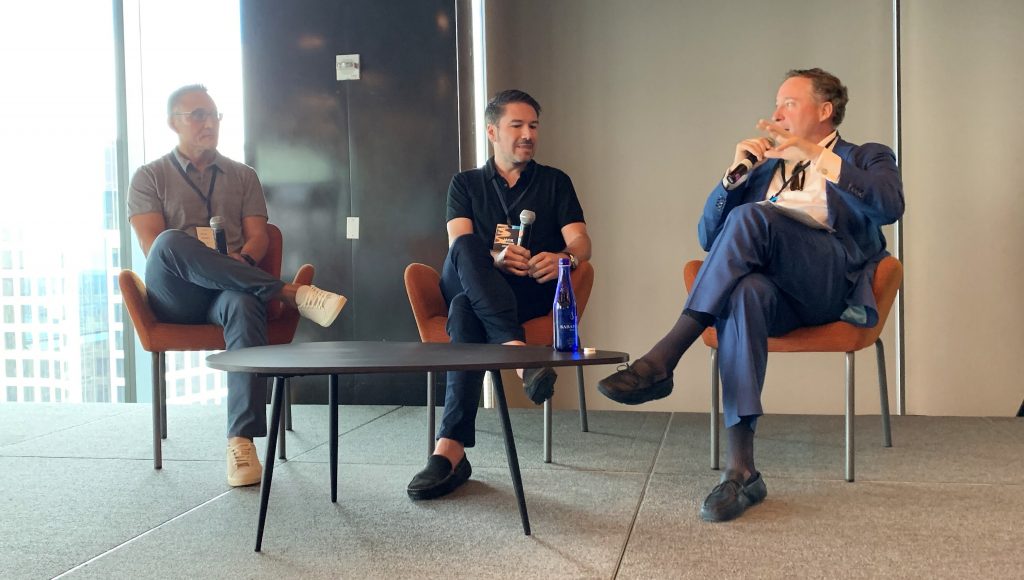 Ashton Newhall (right), partner with the StepStone Group, moderates a panel on VC funding with panelists Ed Sim, founding managing partner of Boldstart Ventures, and Jack Abraham, founder, managing partner and CEO of Atomic.
Ashton Newhall (right), partner with the StepStone Group, moderates a panel on VC funding with panelists Ed Sim, founding managing partner of Boldstart Ventures, and Jack Abraham, founder, managing partner and CEO of Atomic.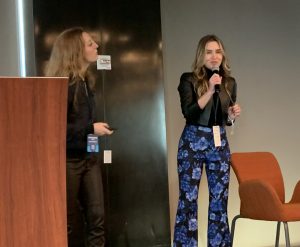 HelloPrenup founders Sarabeth Jaffe and Julia Rodgers pitch their product for producing prenup agreements.
HelloPrenup founders Sarabeth Jaffe and Julia Rodgers pitch their product for producing prenup agreements.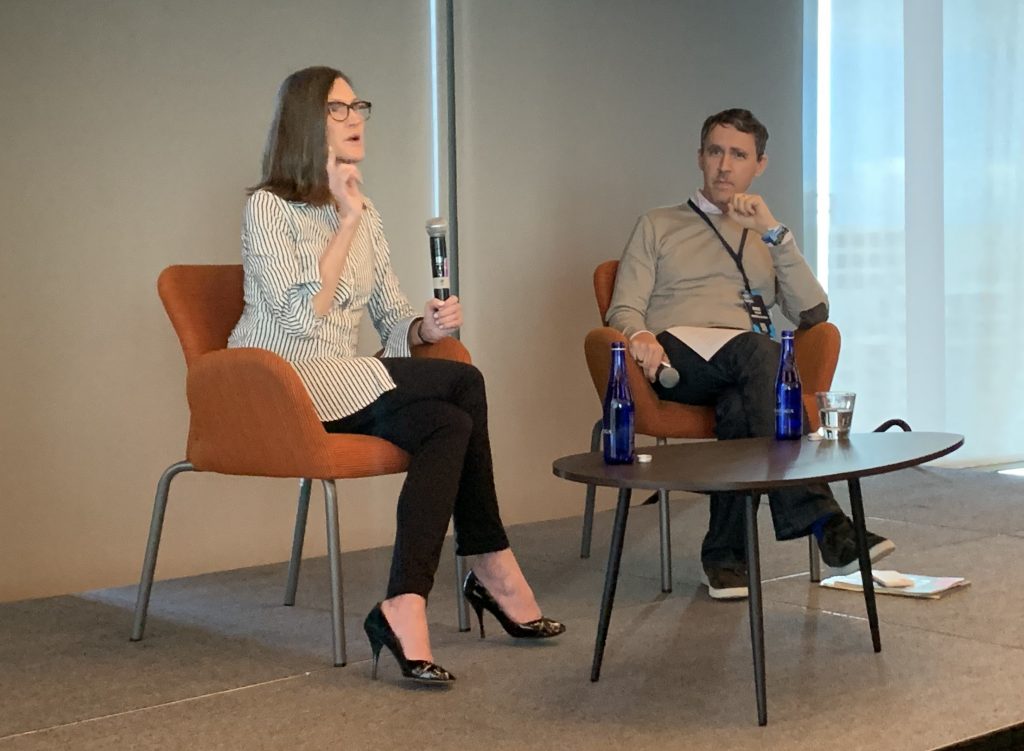 Cathie Wood, founder, CEO and chief investment officer of ARK Investments, is interviewed by Erez Kalir, founder and CEO of Martial Eagle Fund.
Cathie Wood, founder, CEO and chief investment officer of ARK Investments, is interviewed by Erez Kalir, founder and CEO of Martial Eagle Fund.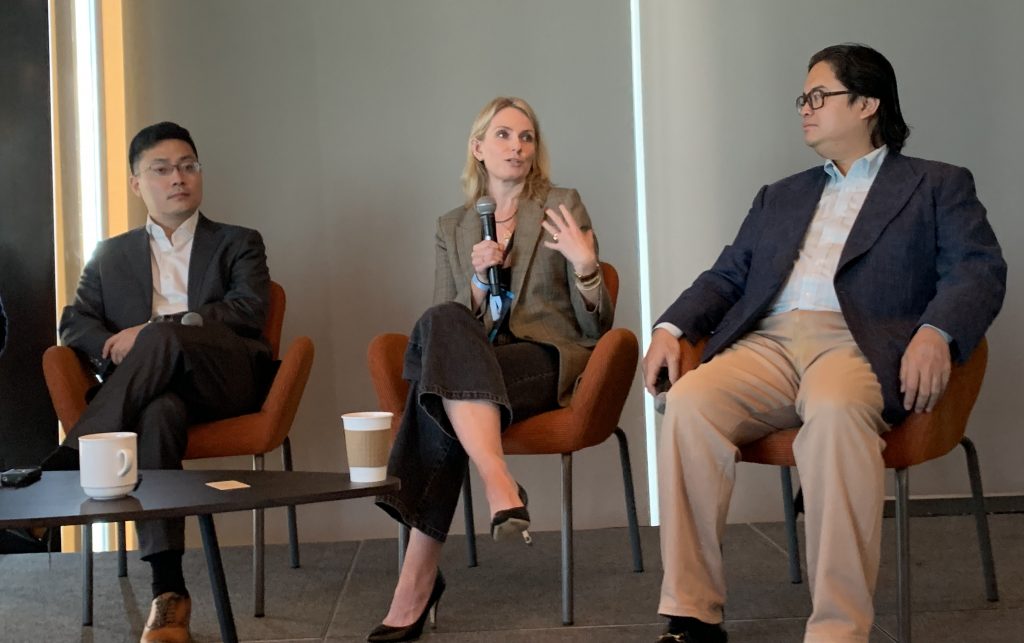 Dru Armstrong, CEO of Affinipay, makes a point, flanked by Tim Hwang, CEO of Fiscalnote, and Kiwi Camara, CEO of DISCO.
Dru Armstrong, CEO of Affinipay, makes a point, flanked by Tim Hwang, CEO of Fiscalnote, and Kiwi Camara, CEO of DISCO.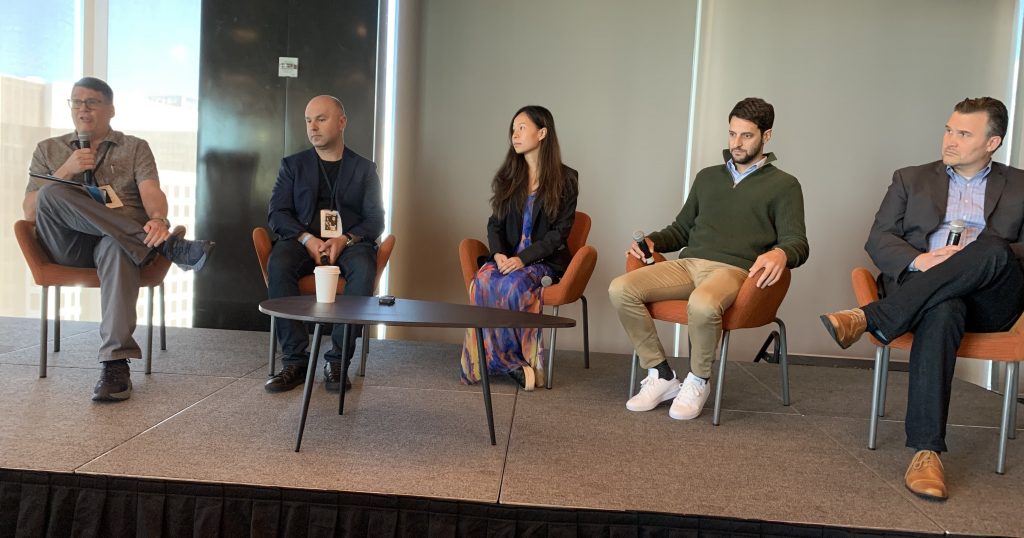 Discussing the intersection of fintech and legal tech, Surepoint CEO Mike Suchsland moderates a panel with Paul Garibian, founder and CEO of Nota, Isabel Yang, CEO of Arbilex, Yago Zavalia Gahan, cofounder and managing partner of Qanlex, and Dan Lear, team member at Gravity Legal.
Discussing the intersection of fintech and legal tech, Surepoint CEO Mike Suchsland moderates a panel with Paul Garibian, founder and CEO of Nota, Isabel Yang, CEO of Arbilex, Yago Zavalia Gahan, cofounder and managing partner of Qanlex, and Dan Lear, team member at Gravity Legal.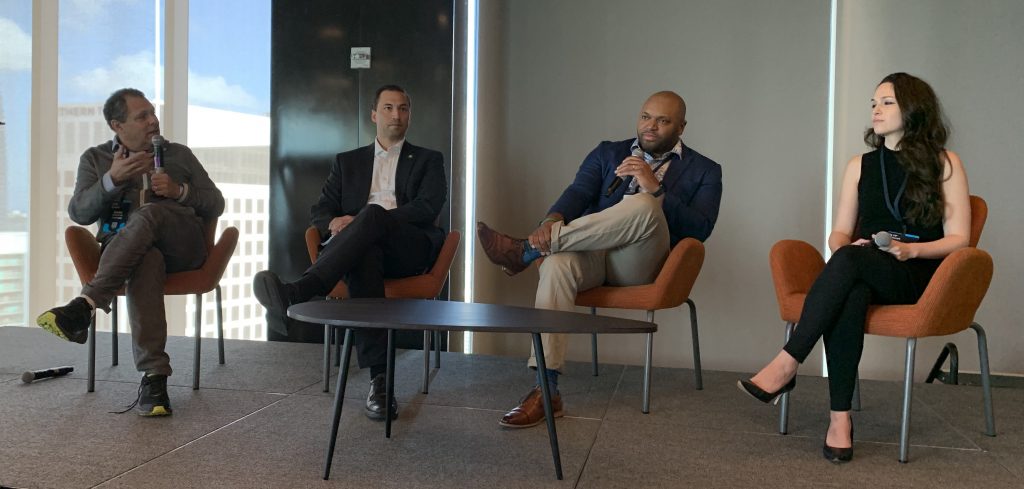 A panel on justice tech was moderated by Stanford Law fellow and former Cisco CLO Mark Chandler, with panelists Judge Schott Schlegel of Louisiana’s 24th Judicial District Court, Andre Creighton, CFO and COO of TurnSignl, and Kristen Sonday, CEO of Paladin.
A panel on justice tech was moderated by Stanford Law fellow and former Cisco CLO Mark Chandler, with panelists Judge Schott Schlegel of Louisiana’s 24th Judicial District Court, Andre Creighton, CFO and COO of TurnSignl, and Kristen Sonday, CEO of Paladin. Yes, there was digital mini golf, as Kathy Zhu, cofounder and CEO of Streamline.AI, lines up her putt.
Yes, there was digital mini golf, as Kathy Zhu, cofounder and CEO of Streamline.AI, lines up her putt.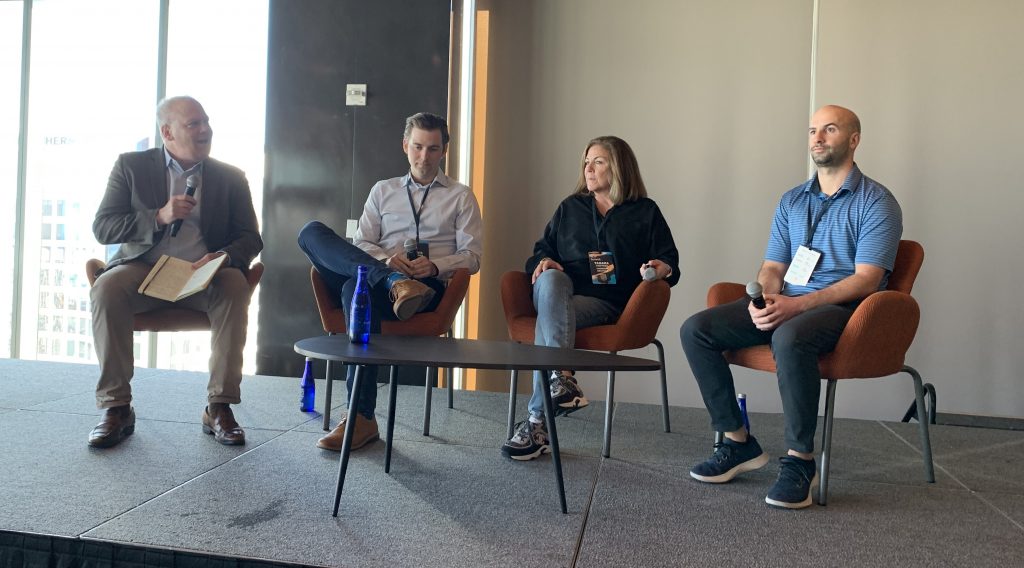 At the first of the final day’s panels, Scott Mozarsky, managing director of JEGI CLARITY, moderates a panel on market dynamics with Davis Thacker, director of strategy and business operations at Carta, Tamara Steffens, managing director of TR Ventures, and Mike Devlin, principal of Touchdown Ventures.
At the first of the final day’s panels, Scott Mozarsky, managing director of JEGI CLARITY, moderates a panel on market dynamics with Davis Thacker, director of strategy and business operations at Carta, Tamara Steffens, managing director of TR Ventures, and Mike Devlin, principal of Touchdown Ventures.
Ripe for InnovationArticle:
